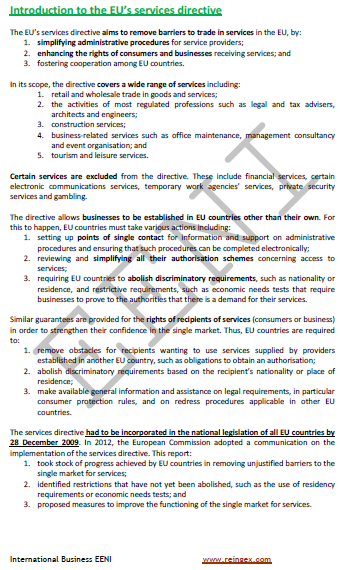EU Services Directive (Single Market, Barriers)

Barriers to trade in services in the EU, Services of general economic interest
- Introduction to the Services Directive of the European Single Market
- Existence of Barriers to trade in services in the EU
- Simplification of the administrative procedures for service providers
- Consumer Protection
- Implementation of the Services Directive
- Exceptions. Services of general economic interest
- European Small Claims Process
Sample - EU Services Directive:

The objectives of the subject “EU Services Directive” are the following:
- To understand the importance of the EU Services Directive in the Single Market
- To identify the Technical Barriers to Trade in Services in the EU
- To know how to take advantage of this Directive

The Subject “EU Services Directive” belongs to the following Online Programs taught by EENI Global Business School:
Doctorate: World Trade.
Masters: International Business, Foreign Trade.
Languages:  or
or  Directiva Servicios UE
Directiva Servicios UE  Directive services de l’UE
Directive services de l’UE  Diretiva de serviços da UE.
Diretiva de serviços da UE.

The crucial EU Services Directive came into force on December 2006. All the EU member countries had to transpose it into their national law before 2009: Austria, Belgium, Bulgaria, Croatia, Cyprus, Denmark, France, Estonia, Finland, Germany, Greece, Hungary, Ireland, Italy, Latvia, Lithuania, Luxembourg, Malta, the Netherlands, Poland, Portugal, Slovakia, Slovenia, Spain, the Czech Republic, Romania and Sweden.
This EU Services Directive applies to all those services that are provided in return for an economic remuneration.
However, there are still many Barriers to trade in services in the EU.
The EU estimates that if this directive were fully implemented, the intra-EU trade in services could increase by 45% and the foreign direct investment would increase by 25%. All this would imply an economic growth between 0.5 and 1.5% of the EU's GDP.
The EU Services Directive aims to remove all the barriers to the free provision of services in the EU single market through:
- Simplification of all administrative procedures related to the companies providing services
- Companies and consumers protection who benefit from these services
- Cooperation between the European Single Market Countries
The EU Services Directive requires to all member countries to repeal all discriminatory and restrictive requirements (such as economic needs tests related to the existence of a demand for services) of their legislation.
Towards the European Digital Single Market.
(c) EENI Global Business School (1995-2024)
We do not use cookies
Top of this page




 EU Students
EU Students